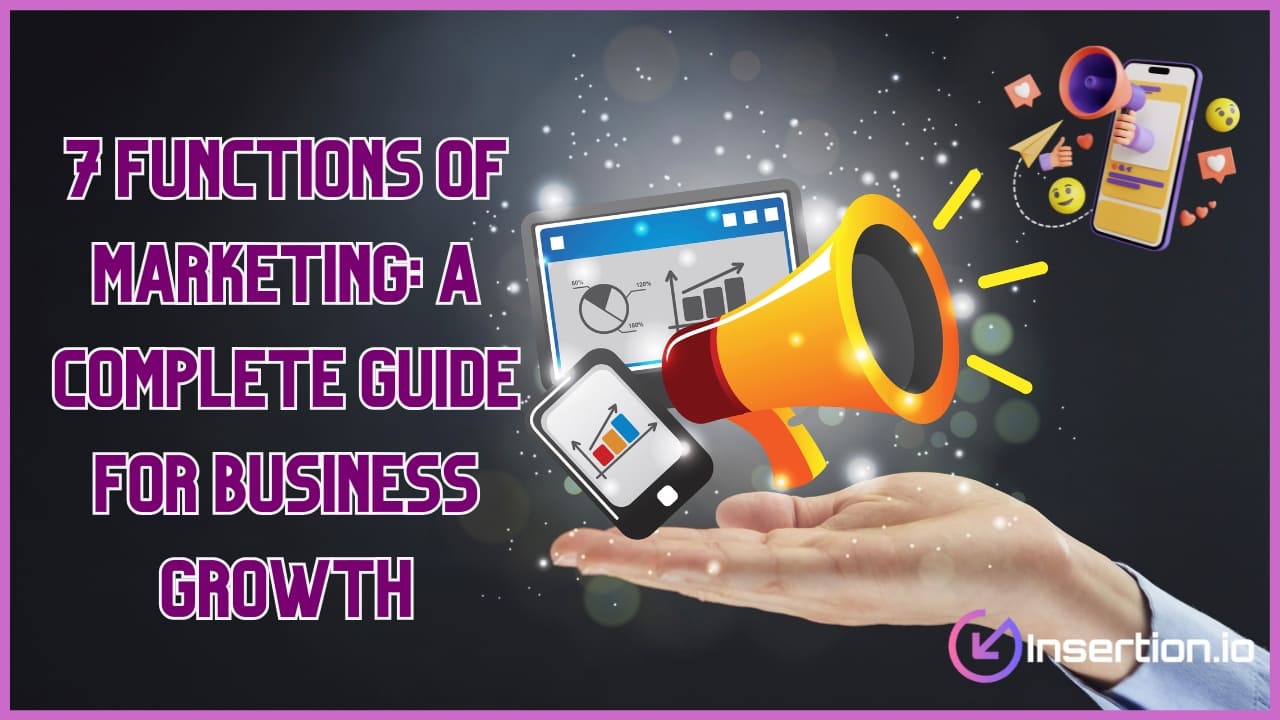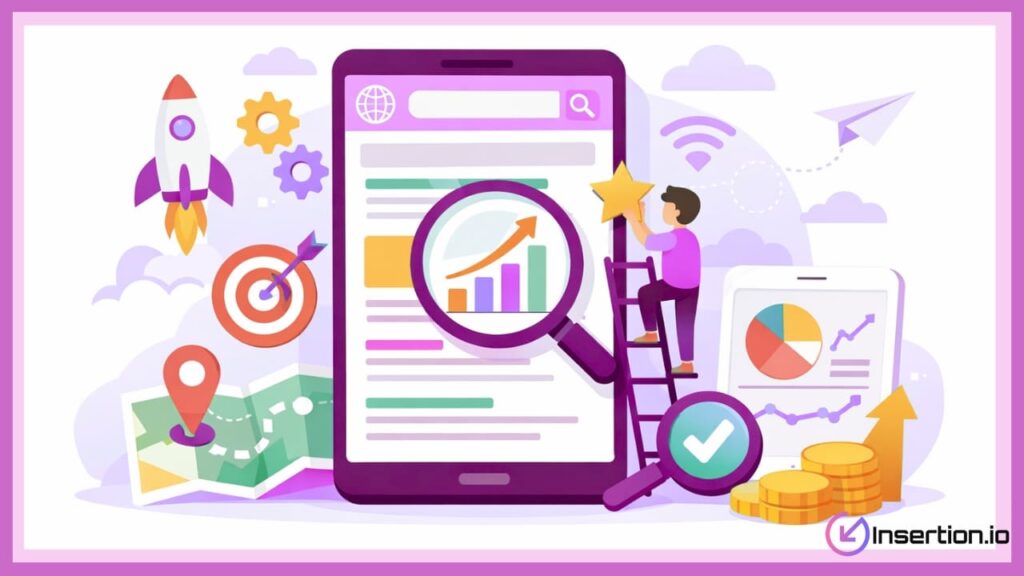
Every business loses revenue because marketing functions go unbalanced or misunderstood. More than 70% of campaigns fail due to an unclear target audience or a wrong pricing strategy. Competitor moves and supply chain delays often worsen losses when firms ignore marketing information management or product and service management. This guide provides a solution overview by detailing the 7 functions of marketing: promotion, selling, product/service management, marketing information management, pricing, financing, and distribution.
Furthermore, you will learn how digital marketing, brand awareness, and promotional strategies integrate with these core functions. The complete guide in this article helps you optimize marketing efforts for business growth.
What are the functions of marketing?
The 7 functions of marketing are vital because they directly connect a product or service with its target customers. These core functions include market research, pricing strategy, promotion, distribution channel, financing, product and service management, and marketing information management. Each marketing campaign, whether digital marketing or traditional marketing, focuses on customer needs and business goals. Furthermore, marketing teams collaborate with sales teams, public relations experts, and research and development teams to optimize marketing efforts. Consequently, effective marketing management builds brand awareness, improves ROI, and strengthens a brand’s reputation, while also generating qualified leads and identifying new growth opportunities.
Why do you need to understand all 7 functions of marketing
Businesses must undoubtedly understand the 7 functions of marketing, as each contributes significantly to long-term growth. Market research helps a marketer analyze industry trends, competing products, and target audience behavior comparatively and effectively. Pricing and promotion guide every marketing campaign, while distribution channels optimize supply chain efficiency and customer engagement. Moreover, marketing information management provides valuable marketing insights, while financing supports product and service management. Furthermore, digital marketing campaigns, content marketing, and email marketing foster brand awareness and improve ROI. Consequently, marketing teams, sales teams, and public relations departments align marketing goals with business goals and customer needs.
The 7 functions of marketing
1. Promotion:

Promotion is one of the seven functions of marketing because it directly connects a product or service with target customers. Marketing teams design promotional strategies that include ad campaigns, content marketing, email marketing, and social media posts. Moreover, public relations efforts, influencer partnerships, and marketing communications build brand awareness and strengthen the brand’s reputation. Additionally, marketers create marketing campaigns that correspondingly align with business goals and customer needs. Furthermore, promotional activities optimize marketing efforts by generating qualified leads, increasing customer engagement, and boosting ROI. Consequently, effective marketing management ensures promotional messages reach the right target audience at the right time.
2. Selling:

Selling is another core function of marketing because it transforms marketing efforts into actual sales revenue. A sales team collaborates with marketers to convert target customers into loyal buyers using promotional strategies. Furthermore, CRM systems, sales funnels, and Google Analytics help optimize sales performance and strengthen customer engagement. Additionally, digital marketing campaigns, content marketing, and traditional marketing channels provide visibility for competing products across new markets. Moreover, customer feedback allows businesses to adjust their marketing strategy and improve products and services. Consequently, selling requires effective marketing communications that align with pricing strategy, customer needs, and overall marketing goals for better ROI.
3. Product/Service Management:

Product and service management is essential because it ensures a business consistently meets the expectations of its target audience. Marketing departments work with research and development teams to design a new product that suits market trends. Moreover, marketers analyze industry trends, customer needs, and competing products before launching or modifying products and services. Additionally, production costs, supply chain challenges, and distribution strategies have a significant impact on management decisions. Furthermore, marketing insights gained from analytics, CRM tools, and customer engagement data guide business goals. Consequently, effective product and service management fosters new growth opportunities while strengthening brand awareness and ensuring products meet both promotional and strategic objectives.
4. Marketing Information Management:

Marketing information management is a vital function of marketing, as it provides decision-making insights to support business goals. Moreover, data from market research, customer feedback, and Google Analytics enhances marketing campaigns and promotional strategies. Additionally, CRM platforms, media buying reports, and marketing tools offer valuable analytics to optimize ROI. Furthermore, marketing teams interpret KPIs and industry trends to ensure effective marketing management. Consequently, marketers use marketing insights to improve products and services while targeting new markets and generating qualified leads. Henceforth, the marketing department collaborates with Salesforce and research and development teams to align marketing goals with overall business objectives.
5. Pricing:

Pricing is an essential function of marketing because it directly influences customer needs, ROI, and market position. Moreover, marketers develop a pricing strategy after evaluating production costs, budget constraints, and competitor actions. Additionally, analytics and marketing tools help marketing teams identify pricing opportunities based on industry trends and target audience expectations. Furthermore, promotional strategies, distribution channels, and marketing campaigns rely on pricing decisions to ensure profitability. Consequently, businesses must align their pricing plans with marketing goals and business goals. Lastly, effective pricing strengthens brand awareness, attracts target customers, and supports marketing efforts across both traditional marketing and digital marketing channels.
6. Financing:

Financing is one of the seven marketing functions because it supports new business growth and marketing campaigns. Marketing teams require budget allocation for ad campaigns, promotional strategies, distribution channels, and product and service management. Additionally, financing and distribution decisions affect supply chain operations, customer engagement, and pricing strategy. Moreover, businesses often collaborate with banks, investors, or internal financing departments to manage marketing costs effectively. Furthermore, CRM systems and analytics tools track ROI from marketing efforts and promotional activities. Consequently, financing ensures marketers have sufficient resources to launch a new product, target new markets, and strengthen the brand’s reputation competitively.
7. Distribution:

Distribution is the final function of marketing, as it ensures that products and services reach target customers efficiently. Moreover, marketing departments develop distribution strategies that optimize supply chain operations and enhance overall customer engagement. Additionally, distribution channels vary between traditional marketing, digital marketing, and B2B platforms, depending on the marketing plan. Furthermore, marketers use analytics, CRM, and marketing insights to evaluate distribution performance against KPIs. Consequently, effective distribution increases ROI, strengthens brand awareness, and meets business goals. Lastly, research and development teams collaborate with sales teams and marketing departments to ensure product availability aligns with promotional strategies and customer needs.
Conclusion
Integrating all seven functions of marketing strengthens your business goals, customer engagement, and ROI significantly. Your marketing team aligns with the sales team, research and development teams, and finance to ensure effective marketing management across channels. Moreover, marketing campaigns that include content marketing, influencer work, email marketing, traditional marketing, and public relations build a strong brand’s reputation. When you analyze marketing tools and analytics, you optimize pricing strategy, distribution channel, and product or service offerings. Ultimately, coordinating promotion, product management, finance, pricing, selling, distribution, and information ensures sustainable growth and a competitive edge. Are you ready to apply all marketing functions to transform your business?
FAQs
1. What is marketing?
Marketing is how businesses promote and sell products or services to meet customer needs.
2. Why is marketing important?
It helps businesses attract customers, build brand awareness, and increase sales.
3. What are the main types of marketing?
The main types include digital marketing, traditional marketing, content marketing, and social media marketing.
4. What is a marketing strategy?
A marketing strategy is a plan that guides how a business reaches its target audience.
5. What does a marketing team do?
They manage campaigns, research markets, create content, and connect products with customers.
6. What are common marketing tools?
Popular tools include email platforms, social media, analytics software, and customer relationship management (CRM) systems.





Leave a Comment